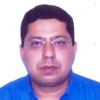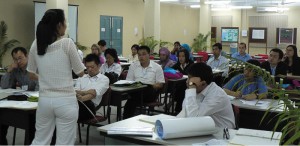Voices from the Sylff Community
The summer of 2006 was passing as a usual Kolkata summer for us at Jadavpur University (JU). The heat and the dust were taking their toll on everybody, and occasional rainstorms brought only temporary relief. Each of us in the JU-SYLFF family was following his or her usual routine —research, teaching, association activities, reviews, and so on. Little did we know that very soon we would receive a big surprise and then be facing an even bigger challenge. Very soon we would be migrating from the local arena to the global domain, from the mundane to the unusual.
On one of those hot and dusty days, the JU-SYLFF project director, Prof. Joyashree Roy, called an emergency meeting of JU’s SYLFF fellows. Each one of us thought that the meeting would be another routine one at which we would have to inform her about the progress of the association’s activities. We had no reason to be apprehensive; we had meticulously charted our progress. But the meeting turned out to reveal a complete surprise for all of us.
At the meeting, Prof. Roy informed us that the Scholarship Division, in a letter to the vice chancellor of the university, had requested JU to host the SYLFF Asia/ Pacific Regional Forum in November 2007. Prof. Roy asked us what our reaction was to this proposal. We were spellbound. We knew that the scale of the program was very large, and we were not sure if we were prepared for it. At the same time, we were proud that our university had been asked to host this mega-event. It was a big honor—but an even bigger responsibility. Unanimously, we voiced our consent— knowing well that we were facing a big challenge. But each of us was determined to make the best effort to turn the event into a grand success.
Life was never the same thereafter. Days were spent making decisions about activities, responsibilities, deadlines, and teams. All of us knew that the planning had to be meticulous and that we must learn to work together. Since that summer of 2006, every member of the JU-SYLFF family made the maximum effort possible for the cause of the forum. The fellows not only worked overtime, but did so with determination and zeal that knew no bounds. The JU-SYLFF project director and the SYLFF steering committee members constantly worked as a guiding force —setting targets, regularly monitoring progress, and making critical decisions on a daily basis. We received unstinted support from numerous people at the university. There was a palpable enthusiasm within the university’s academic community regarding the theme of the forum: Human Rights and Creative Leadership. India, whose economy is one of the fastest-growing in the world, is faced with the critical task of guaranteeing human rights for its huge population. The social sciences faculty and their students wanted to learn from the experiences of other nations—a prospect that the forum assured. Also, the prospect for deliberating on the many facets of creative leadership in the context of human rights in various economies, in different phases of development, was extremely exciting to many in the JU academic community.
The support that we received from the Scholarship Division was tremendous. The tool kit that the division provided for organizing the forum made our work simpler than it otherwise would have been. The kit charted out the major activities and important timelines. Quick decisions, constructive suggestions, and timely reminders flowed constantly from the Scholarship Division, which always responded within 24 hours to our questions and concerns—whether it was a weekday or a weekend. And each response was filled with encouragement and enthusiastic support for our endeavors.
A lot of work had to be done— arranging the venue and accommodations for the guests, preparing the program schedule, arranging city tours and visits to sites for social action, and so on. The university extended its help to us, thereby facilitating our completion of these tasks. Soon after the local associations and the SYLFF institutions finalized the list of participants, we started working on the participants’ travel schedules. This involved coordinating with almost 60 people from different countries. Each participant was extremely cooperative, accommodating some odd requests from us and greatly easing our work. We constantly felt that we were working as part of one big family within which distance, geographical boundaries, or differences in languages did not matter; what mattered was the success of a common cause.
The forum was held November 20th–22nd, 2007, at JU. I was fortunate to participate in the forum. I wish to take this opportunity to thank all the members of the JU-SYLFF association who selected me as an official participant from JU. Participating in the forum was indeed a once-in-a-lifetime experience —meeting people from diverse cultures, interacting and exchanging ideas with members of a worldwide academic community, and most importantly, making friends with people from different countries.
The three days of the forum were characterized by intense discussions on the forum’s theme. The oral and poster presentations focused on the issue of human rights and how creative leadership can create and sustain an enabling environment for realizing human rights. The spirited keynote speech by Dr. Egla Martinez- Salazar (a SYLFF Prize winner) raised a critical question: Who benefits from the existing sociopolitical and legal structures and human rights activities? With this important question as a backdrop, the participants discussed the role of education, economic development, culture, politics, governance, and civil society as means for creating an environment that supports human rights. The discussions revealed that besides considering the fundamental human factors while embarking on any human rights related activity, it is also necessary to do a cost-benefit analysis of any strategy intended to ensure human rights. The discussions also brought forward the fact that creative leaders can exist in different spheres of an economy, society, and polity, and that each leader can contribute in her or his own ways (large or small) to strengthen the forces that are vital for realizing human rights. Case studies and reports of different countries’ experiences stressed the role of creative leaders as agents of change.
The discussions at the forum revealed that the concept of human rights has a trans-disciplinary dimension to it. This topic must be moved from the domain of lawyers to the realms of various disciplines, so that feasible and holistic solutions to human rights problems can be obtained. The forum was instrumental in reshaping the way that many of us think and act.
The forum also gave the participating fellows an opportunity to learn about networking. The coordinators, Ms. Jeanne Ing Lee and Ms. Sherilyn Siy, acting on behalf of the SYLFF Fellows Council, took great care to conduct memorable sessions where the participants learned how to build successful and effective networks. The fellows shared the best practices of their networks and the steps they have taken to promote team-building and collaboration. These best practices can become models for creating sustainable networks that are spirited and performing.
Starting in the summer of 2006, our journey to the SYLFF Asia/Pacific Regional Forum in the winter of 2007 was an extremely thrilling and rewarding experience. That journey taught us fundamental skills for organizing an international event. We have also benefited academically—through the rich discussions on economic, social, political, and cultural aspects of human rights.
As a result of that journey and the forum, the SYLFF fellows at JU hope to host another SYLFF regional forum sometime in the future.

